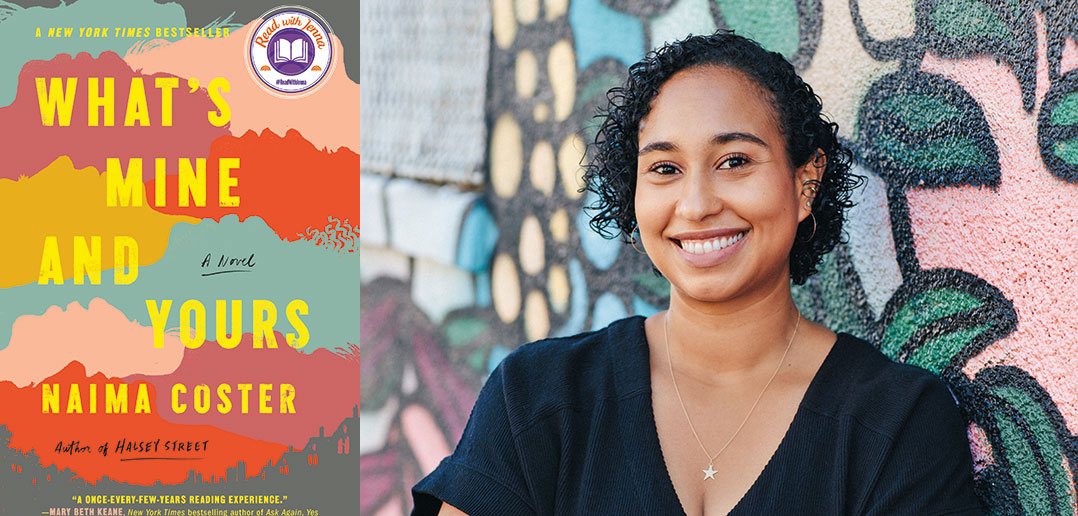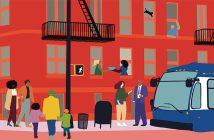The Piedmont, North Carolina
Jade’s lips were burning for a cigarette, her legs jumping underneath the seat as she pulled into the lot of Central High School. She parked and turned to look at Gee. He was slumped against the window, his face pressed against the glass.
She shook him by the shoulder and called his name.
“This is a good thing,” she said. “I wish this had happened to me when I was your age.”
Still, he wouldn’t look at her.
“I’m not saying it’s going to be easy.”
Gee tuned out his mother and surveyed the lot. It was nearly full, although the town hall wasn’t set to start for another half hour. He’d been dreading the start of the school year all summer. He hadn’t had a good night’s sleep since he got the letter approving his transfer to Central. He was gnashing his teeth again.
“You don’t know,” Jade went on, “what a difference this is going to make. This is a good school. I’ve been lucky. I don’t want you to have to count on luck.”
Gee’s mother was good at pep talks, reminding him to doublecheck his homework, put lotion on his hands. She liked to monitor, advise, steer him the right way. Sometimes he thought he ought to be more grateful. But she didn’t seem to notice that his insides were quaking. Gee felt his jaw clamp shut. He pried it open to speak.
“What’s the point of this meeting anyway? What is there to discuss? It’s all final, isn’t it?”
“It’s supposed to be a welcome.”
“Will it be?”
“Sure. One way or another.” Jade gave him a tight smile, then patted his leg and said, “You’ve got to trust me.” They climbed out of the car, and Jade flung her arm around him. It felt strange, but he let her hold him anyway.
The school was four stories, a brick building with white windowpanes and eaves. Dogwood trees guarded the small lawn between the lot and the entrance.
There was a clatter of car doors opening and closing. Gee recognized a few of his classmates and their mothers trudging toward the school. Adira was approaching the school in a fuchsia windbreaker and faded jeans. She had come in regular clothes, and Gee felt conspicuous in his collared pinstriped shirt, his good pants. Adira was calm and easy all the time, even now, sandwiched between her tall parents, the Howards. She was one of the few kids at school Gee could call a friend, but it wasn’t saying much because Adira was friends with everyone. She was the kind of girl who kissed her friends on the cheeks, complimented strangers on their sneakers or hair and meant it. She could reach for you, hug you, wink at you, laugh, and it didn’t seem like flirting. She bounded toward him, snatched up his hand. It felt natural, good. It didn’t set his skin on fire.
The Howards relieved him of Jade, and the adults went ahead, snapping together into a knot, lowering their heads and their voices. Gee couldn’t tell if they were worried. The papers said the initiative to merge the city and county school systems was popular. They were piloting new programs to make all the schools attractive so county kids would want to transfer, too. Most students would get to stay where they were. But it was hard for Gee to believe people were coming to this meeting in droves all because they wanted to shake hands. There had been talk of a band of white parents who planned to protest. He had no particular fear of white people; Gee sorted them into good and bad, safe and not safe, the way he did with everyone else. But he knew even good people could turn, let alone good white people.
Adira had linked her arm with his, and she didn’t seem to be thinking about the meeting at all. She was fawning over Jade. She admired her knee-high boots, her black dress cinched with a silver chain at the waist. “She’s so glamorous,” Adira said. “She doesn’t even look like a mom.”
Jade had recently cut her hair into a mohawk, long on top and buzzed around her ears. Since becoming a nurse, she had stopped wearing her nose ring, but her ears were studded with gold, her nails painted a red so deep it seemed black. She liked to stand out, even now, a day when Gee needed to blend in. Gee shrugged at Adira, and she looked confused, as if he should be flattered, as if he should want people to assume that Jade was his sister and he was a parentless freak.
“What’s the matter? Aren’t you excited? I’ve never even been inside here before. Look at these windows! It’s so bright.”
“My head hurts,” said Gee. It was his go-to line when he had to explain why he wasn’t coming along for a soda after school, or why he hadn’t raised his hand in class, or why he didn’t want to go and meet some girls. Even when it didn’t work, and people saw that it was a lie, he got what he wanted anyway: to be left alone.
They followed the signs down the hallway. The crowd was mostly kids Gee didn’t recognize, shepherded by their fair-headed parents.
They reached the auditorium and saw that nearly every seat was filled, the murmurs of the crowd a low roar. Linette stood sentinel over three seats in the front row, among a contingent of students from Gee’s school and their families. He recited their names to himself like a psalm—Rosie, Ezekiel, Magdalena. Humphrey, Austin, Elizabeth, Yvonne. He’d known most of them since elementary school, and although they were all clumped together now, soon they’d be dispersed, just a handful among the two hundred new students at Central this fall. Would it matter they were all there together? Would they be able to find each other then? Without willing it, his teeth began to grind against each other, back and forth. A sound like tearing paper filled his ears.
Linette could always seem to sense his nerves. She kissed him on the cheek, which did nothing to still his trembling, but he was thankful for her all the same. They settled into the battered, cushioned seats, unlike the hard-backed chairs at Gee’s school. Gee sat between the two women, and they turned their eyes toward the stage.
The blue velvet curtains were swept back, and a dozen school officials sat in a row before a long wooden table. Gee recognized one of them as the principal. She wore a gray suit and pointy heels, her hair pinned into a severe blond bun. Gee had met her at that first meeting in June for the new students who’d be joining in the fall. She had shaken his hand but seemed harried, reluctant. It was a relief that she hadn’t said much, and that he’d had to say nothing, although her silence and her tepid smile had left him wondering whether she was repelled by him.
A black man sat at the edge of the officials’ table, and Gee wondered who he was. He was broad shouldered, clean-shaven, handsome in a blazer and tie. Maybe Gee should have worn a tie, too? He strained to read the little paper sign in front of him that bore the man’s name and title, but he couldn’t see, and soon the principal was calling everyone to order.
She welcomed parents and students, old and new. There was scattered, cheerless applause. Gee made sure not to look at his mother. He could feel the energy of her body. She was burning, desperate to say something out loud. It made him want to disappear.
The principal announced all the good things they had to look forward to: a nearly unchanged student-teacher ratio, class sizes kept under thirty, funding for a whole new line of programming: a choir, a kiln in the art room, a drama club that would put on productions in this very theater. It was what they’d been promised in exchange for the new students. Other high schools had gotten microscopes or specialists to redo the math curriculum; Central had gotten money for the arts. They were gaining more than they were losing, and that was before even accounting for the new students, whose differences would make the community even stronger.
“Now we can say we’re an even better reflection of the city, the county, and the changing face of North Carolina. And above all, the law has spoken. Our representatives have spoken. It’s our duty, as citizens, to open up our doors and move into the future.”
A chorus of boos rolled over the room. The principal held up her hands. “We’re not here for debate. This is a time to look ahead. We’ll open the floor now for questions, words of welcome— that’s why we’re here.”
Before she was through, a line had started to form at each of the microphone stands in the auditorium, one in the rear, the other in the aisle next to Gee, Jade, and Linette. Gee sank lower in his seat. His teeth scraped together, and he felt a familiar shock run from his jaw to his ear. He winced from the pain and listened as the speeches started.
A woman with gray hair and Coke-bottle glasses was first. “I hear everybody here talking about welcome. New beginnings! But what about goodbyes? What about mourning?” She was met with applause, an echo of Yes! “To make room for these two hundred new kids, we’ve had to let go of two hundred kids who have been at Central since they were freshmen. All because the school board and the city have got an agenda? My daughter is losing every single one of her best friends to this new program, and she’s going to be a junior! It’s a critical year, and she’s going to have to start all over! How is that fair?”
By the end, she was shouting, and the cheers went on for so long, the principal had to stand and ask the crowd to quiet down. The deluge kept coming.
“Okay, we’re keeping our teachers; okay, class size is staying the same. That doesn’t mean this school is the same. Everybody knows it’s the students that make the school. And now we’re going to have these kids—these kids who are coming from failing schools—making up twenty-five percent of every grade. Twenty-five percent! They’re going to hold our kids back! These kids aren’t where our kids are in their education or their home training. And it may not be their fault, but it’s not my kid’s fault either!”
A meek-mannered woman with a short black bob and glasses edged to the microphone as if it caused her great pain to do so. She began in a low voice. “Everybody deserves a fair shot in life—I believe that. I always have. That’s what America is about. My son is applying for college this year, and I’ve heard it on good authority that this wasn’t random. That these kids were handpicked because they’re star students. And now, my kid’s ranking is going to fall. What has my son been working for if these new students are going to come in underneath his nose and steal everything he’s been working for, and everything we’ve all been working for? Everything we do is for him.”
“I know this isn’t about integration. It isn’t about what’s right. They put nice words in the pamphlets, but I’m not fooled. This is about money, money, money, and the city being greedy. They’re playing around with my kids’ future. Central might not hit that county quota of no more than forty percent of students on free or reduced lunch. Because we may leave. A lot of us may leave. I’m looking into private school for my girls because I can’t trust the administration here, and I can no longer trust the city I’ve lived in, and that my family has lived in, for generations, for over one hundred years!”
Gee felt Linette stir beside him. Her leg thumped underneath her, and she knotted her hands in her lap. She was nervous, and it was catching. He leaned away from her in his seat. Jade reached over to take Linette’s hand and steady her. The women locked fingers. Jade was swinging her head from side to side, disagreeing with the latest speaker at the podium. Gee knew it was only a matter of time before she burst.
Next there was a man in a plaid shirt, a long beard and sideburns. He pointed at the floor for emphasis with every sentence. He was so steady, so even, it was terrifying.
“Am I the only one who will say it? These kids could be bad kids. What about background checks? How are you going to keep our kids safe? Are we going to put in metal detectors? What about in the hallway, when my daughter is walking between her classes? And what about the parking lot? We ought to put cameras out there.”
Gee felt his vision tunnel, the room around him turn to black at the edges. He mopped his forehead with his sleeve. He was turning inward, closing up. He nearly missed Adira sliding to the microphone, her hands clasped primly in front of her, her head high.
“My name is Adira Howard, and I’ll be a junior here at Central next fall. I came tonight because I was excited. Because I want a future too—”
Gee wondered at Adira. She was stupid and brave and beautiful all at once.
“My family has been here for generations, too. And I deserve my future as much as anybody else. It hurts to know I’m not welcome here, at a school that’s only fifteen minutes away from my house, all because of the color of my skin.”
There was an encouraging whistle from the front row, and the Howards stood up, clapping for their girl. A few white grown-ups stood, too, to applaud Adira, and Gee wondered why they hadn’t spoken yet. Where were all the people who had published op-eds in the paper about the benefits of the program? Where was that majority who supported this change?
When the boos started up again, while Adira was still at the microphone, Jade sprang up to stand in line. A balding man in a crimson polo shirt was set to speak first. He shook his head for a long while before he began.
“This is not about race,” he said. “This is about fairness. We don’t have to give up our rights to the whims of whoever is in office right now. I know it must have taken guts for that little girl to stand up here and speak, but, young lady, you’re dead wrong. This has nothing to do with the color of your skin. I taught at North Carolina A&T, a historically black college, for twenty years before moving here—I am not a racist, and it’s criminal for you, or anyone, to suggest I am.”
There was hooting and screaming for the man at the microphone. The principal hammered at her podium with a gavel she hadn’t used before. The school officials fidgeted onstage, except for the black man who sat calmly on the edge of his seat, his hands folded into a steeple. His eyes were invisible behind the sheen of his glasses. Gee wondered how he managed to sit up there, with all those people watching, whether it was better to be onstage or in the crowd in moments like this. Next, it was Jade.
“My husband wanted the best for our son. We’ve spent our lives trying to figure out how to give it to him. We haven’t had our lives handed to us, like some of the people in this room. For a lot of you, your kids coming to this school is just them inheriting what’s rightfully theirs—the future they’ve been headed toward since they were born. But for my son, it’s a change in his fate. And his fate has been changed more than once, and not for the better, and none of that was his fault.”
Gee felt himself shrink.
“And now that he’s got this chance, we’re not going to let anyone take it from him. He’s not going to be left behind. And I’m going to be here, every morning, and every afternoon, to make sure he’s welcomed the way he ought to be, the way the law says he deserves. Put in your metal detectors. Put your cameras in the parking lot. Let me tell you—you’ll be seeing my face.”
There was whooping and hollering as Jade returned to her seat. Gee felt his anger focus on his mother. She slid into the seat beside him, and he crossed his arms away from her.
“What did I do now?” she asked, and he wondered whether there was a point in being honest.
“I just want to fit in, and you’re talking like you’re ready to go to war.”
“Do you hear these other parents?”
“I don’t care about them. What about me? I don’t want any trouble.”
Jade shook her head. “These people are just talking cause there’s nothing else they can do. You’ll see. You just got to let them know they can’t take you for a punk, that you’ll fight back—”
A shrill voice startled them. Someone at the back of the room was speaking right to Jade.
“To the young woman who just finished up here—”
A fair, slender woman stood at the microphone, her hair large and feathered around her.
“How dare you say anything in my life has been handed to me! If your husband wanted the best for your son, he should have done what I did and moved him into this district fair and square. I made sacrifices to get here. It cost me. It cost my children. And I’m not just going to give it up so you can get handed what you think you deserve—that’s not right, and that’s not American.”
The applause that erupted into the auditorium was the most riotous yet. People stomped and rose in their seats. The principal banged her gavel uselessly. The large-haired woman went on, and Gee couldn’t bring himself to look away from her narrow face, the bright aperture of her eyes.
“There’s a bunch of us,” she said. “We’re putting together a march! And we’re not going to stop there. The school year hasn’t started yet. We’ve got time. I’ll be standing right back here with flyers for anyone else who wants to get involved. Come find me. My name is Lacey May Gibbs.”
From What’s Mine and Yours. Copyright © 2021 by Naima Coster. Reprinted by permission of Grand Central Publishing, New York, NY. All rights reserved.
Naima Coster, GSAS ’12, is the author of the novel Halsey Street (2018), which she began writing as a student at Fordham, where she earned a master’s degree in English with a focus on creative writing. In 2020, she was named to the National Book Foundation’s “5 Under 35” list, which recognizes five fiction writers under the age of 35 whose work promises to leave a lasting impression on the literary landscape.



